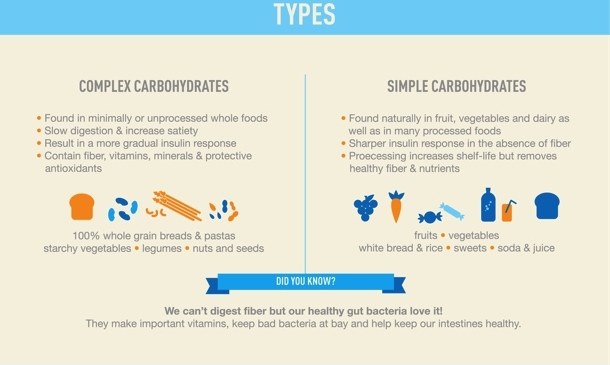Carbohydrates are a necessary staple of your diet to help provide energy to cells in your body. Despite this necessity, high carbohydrate intake has been connected to obesity and type 2 diabetes. Too much consumption of anything can always be a problem, but for carbohydrates, the type of carbohydrate can make a big difference.
Because carbohydrates can be found in anything from vegetables to sugary beverages, knowing the difference between the types of carbohydrates is crucial to know if the carbs are doing you any good.
Simple vs Complex Carbohydrates
Depending on the number and type of sugar molecules in the carbohydrate it can be classified as either simple or complex. Without diving into the chemistry of what makes them simple or complex, the general rule of thumb is that complex carbohydrates are healthier.
Simple carbohydrates are most commonly found in very sugary foods – however, they are present naturally in some fruits. Food high in fiber or starch often contains complex carbohydrates, like fruits, vegetables, and whole wheat.
For additional clarity, it is worth noting that some foods will use the phrases “whole” and “refined” to describe carbohydrates. Whole carbohydrates (like whole grains) are complex, while refined carbohydrates are the same as simple.
Carbohydrates and Your Blood Sugar
Simple carbohydrates are often packed with sugar that results in a spike in blood sugar levels after consumption. We know consumption of “added sugars” is connected to an increased risk of cardiovascular disease. These sugary simple carbohydrates are easily digested and as a result, quickly give rise to your blood sugar.
Knowing the glycemic index (GI) of some of the foods you commonly eat understand what the food you eat does to your blood sugar.
However, consuming complex carbohydrates does not replicate this blood sugar spike. In fact, consuming a diet high in fiber and whole grains has been associated with a decreased risk of disease.
White Bread vs Whole Wheat Bread
This is one of the most straightforward cases for the difference between simple and complex carbohydrates. Wheat bread includes most of the nutrient components that provide health benefits, while white bread is processed till only the unhealthy (though better tasting) part is left.
The lack of fiber in white bread makes it easy to digest causing it to rapidly spike blood sugar (not to mention the high amount of sodium usually found in white bread). Wheat bread is not without preservatives of its own, but the high fiber makes it much easier for your body to digest in a way that keeps your blood sugar under control.
The Rising Popularity of Low Carbohydrate Diets
If carbohydrates are a crucial addition to your diet, why are low carbohydrate diets popular? While carbohydrates are not the sole cause of someone’s obesity, research has found low carbohydrate diets have led to weight loss in patients with obesity and type 2 diabetes.
For most individuals though a low carbohydrate diet has minimal benefits. A study conducted by the National Health and Nutrition Examination Survey in 2010 even indicated those who ate the least amount of carbohydrates tended to be more likely to die from a stroke, cancer, or coronary heart disease.
What’s the Takeaway?
Carbohydrates are unlikely to be the source of your weight gain. If you are not yet, make simple changes to your diet to introduce complex carbohydrates – like switching from white bread to wheat bread.
Above all, stay away from simple carbohydrates and foods high in sugar. Not only is the sugar bad for you, but the foods can also be too quickly digested, providing you minimal nutritional benefits and a jump in blood sugar.



